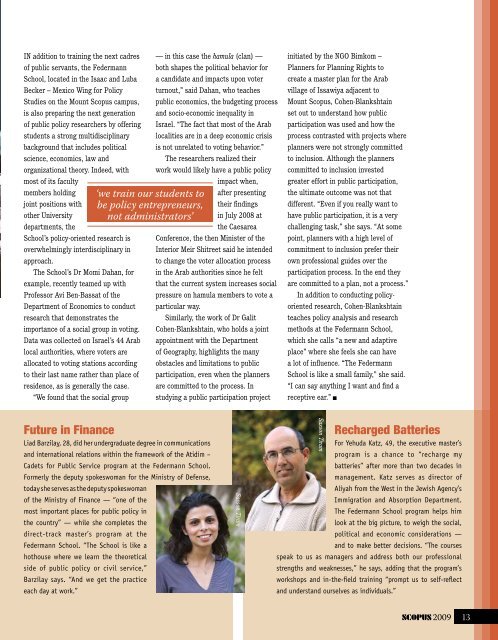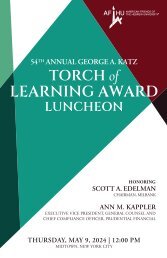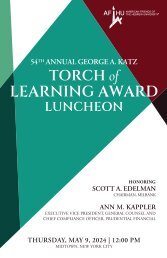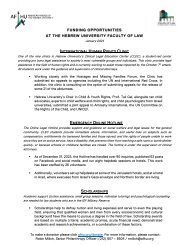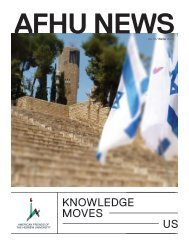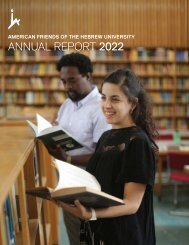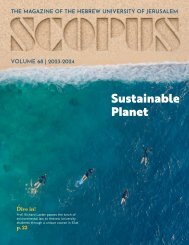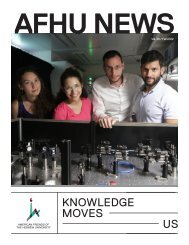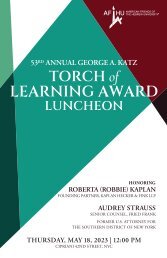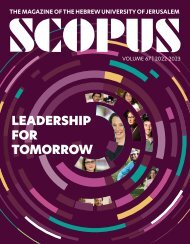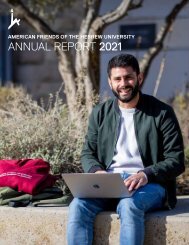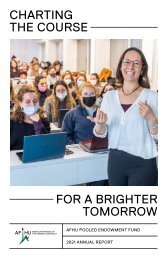Create successful ePaper yourself
Turn your PDF publications into a flip-book with our unique Google optimized e-Paper software.
IN addition to training the next cadres<br />
of public servants, the Federmann<br />
School, located in the Isaac and Luba<br />
Becker – Mexico Wing for Policy<br />
Studies on the Mount Scopus campus,<br />
is also preparing the next generation<br />
of public policy researchers by offering<br />
students a strong multidisciplinary<br />
background that includes political<br />
science, economics, law and<br />
organizational theory. Indeed, with<br />
most of its faculty<br />
members holding<br />
joint positions with<br />
other University<br />
departments, the<br />
School’s policy-oriented research is<br />
overwhelmingly interdisciplinary in<br />
approach.<br />
The School’s Dr Momi Dahan, for<br />
example, recently teamed up with<br />
Professor Avi Ben-Bassat of the<br />
Department of Economics to conduct<br />
research that demonstrates the<br />
importance of a social group in voting.<br />
Data was collected on Israel’s 44 Arab<br />
local authorities, where voters are<br />
allocated to voting stations according<br />
to their last name rather than place of<br />
residence, as is generally the case.<br />
“We found that the social group<br />
‘we train our students to<br />
be policy entrepreneurs,<br />
not administrators’<br />
— in this case the hamula (clan) —<br />
both shapes the political behavior for<br />
a candidate and impacts upon voter<br />
turnout,” said Dahan, who teaches<br />
public economics, the budgeting process<br />
and socio-economic inequality in<br />
Israel. “The fact that most of the Arab<br />
localities are in a deep economic crisis<br />
is not unrelated to voting behavior.”<br />
The researchers realized their<br />
work would likely have a public policy<br />
impact when,<br />
after presenting<br />
their findings<br />
in July 2008 at<br />
the Caesarea<br />
Conference, the then Minister of the<br />
Interior Meir Shitreet said he intended<br />
to change the voter allocation process<br />
in the Arab authorities since he felt<br />
that the current system increases social<br />
pressure on hamula members to vote a<br />
particular way.<br />
Similarly, the work of Dr Galit<br />
Cohen-Blankshtain, who holds a joint<br />
appointment with the Department<br />
of Geography, highlights the many<br />
obstacles and limitations to public<br />
participation, even when the planners<br />
are committed to the process. In<br />
studying a public participation project<br />
initiated by the NGO Bimkom –<br />
Planners for Planning Rights to<br />
create a master plan for the Arab<br />
village of Issawiya adjacent to<br />
Mount Scopus, Cohen-Blankshtain<br />
set out to understand how public<br />
participation was used and how the<br />
process contrasted with projects where<br />
planners were not strongly committed<br />
to inclusion. Although the planners<br />
committed to inclusion invested<br />
greater effort in public participation,<br />
the ultimate outcome was not that<br />
different. “Even if you really want to<br />
have public participation, it is a very<br />
challenging task,” she says. “At some<br />
point, planners with a high level of<br />
commitment to inclusion prefer their<br />
own professional guides over the<br />
participation process. In the end they<br />
are committed to a plan, not a process.”<br />
In addition to conducting policyoriented<br />
research, Cohen-Blankshtain<br />
teaches policy analysis and research<br />
methods at the Federmann School,<br />
which she calls “a new and adaptive<br />
place” where she feels she can have<br />
a lot of influence. “The Federmann<br />
School is like a small family,” she said.<br />
“I can say anything I want and find a<br />
receptive ear.”<br />
Future in Finance<br />
Liad Barzilay, 28, did her undergraduate degree in communications<br />
and international relations within the framework of the Atidim –<br />
Cadets for Public Service program at the Federmann School.<br />
Formerly the deputy spokeswoman for the Ministry of Defense,<br />
today she serves as the deputy spokeswoman<br />
of the Ministry of Finance — “one of the<br />
most important places for public policy in<br />
the country” — while she completes the<br />
direct-track master’s program at the<br />
Federmann School. “The School is like a<br />
hothouse where we learn the theoretical<br />
side of public policy or civil service,”<br />
Barzilay says. “And we get the practice<br />
each day at work.”<br />
Sasson Tiram<br />
Sasson Tiram<br />
Recharged Batteries<br />
For Yehuda Katz, 49, the executive master’s<br />
program is a chance to “recharge my<br />
batteries” after more than two decades in<br />
management. Katz serves as director of<br />
Aliyah from the West in the Jewish Agency’s<br />
Immigration and Absorption Department.<br />
The Federmann School program helps him<br />
look at the big picture, to weigh the social,<br />
political and economic considerations —<br />
and to make better decisions. “The courses<br />
speak to us as managers and address both our professional<br />
strengths and weaknesses,” he says, adding that the program’s<br />
workshops and in-the-field training “prompt us to self-reflect<br />
and understand ourselves as individuals.”<br />
<strong>2009</strong><br />
13


